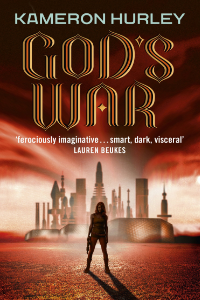 God’s War
God’s War
(Bel Dame Apocrypha, Book 1)
Kameron Hurley
Genre: Science Fantasy
Publisher: Del Rey
Format: Paperback, 432 Pages
Date: 16th January 2014 (First Published 2010)
ISBN-10: 0091952786
ISBN-13: 978-0091952785
Purchase From: Amazon | Book Depository
Part science fiction, part urban fantasy, God’s War is a rather difficult novel to nail down, due in no small part to its inherent contradictions. For example, certain facets of the book are incredibly original and unique, yet the plot progresses in a very predictable manner; there is little, if anything, within the run-of-the-mill narrative that will take you by surprise. Also, several interesting characters are introduced throughout the story, yet interesting never translates into memorable; you’ll have a hard time remembering any names once you’ve finished reading the book. It is a novel that is rather good at setting up expectations, but not so good at meeting them.
RATING:While there is no faulting Kameron Hurley’s ability to meld the highly unusual with the overly familiar, it’s certainly the case that (depending on your point of view) God’s War is a novel about which it can either be said: its perfections are negated by its flaws, or its flaws are negated by its perfections. Whichever side of the fence you fall on will likely be the determining factor in whether or not you enjoy reading it.
The opening paragraphs of Hurley’s debut introduces the main character casually revealing she has recently sold one of her body parts (her womb, if you’re wondering). This introduction to Nyxnissa so Dasheem aka Nyx, instantly promises something you don’t typically encounter in most works of fiction; a heroine who may in fact be an anti-heroine. It’s a promise Hurley wastes little time delivering on, and in doing so it is one of the few times that an expectation set up in the story is met. Nyx is not a flawlessly, virtuous Mary Sue, nor does she ever threaten to become one.
It is noteworthy that some of the marketing for God’s War made a point of highlighting just how different Nyx is from other urban fantasy protagonists. There is one particularly amusing YouTube video uploaded to the author’s channel that does a good job of lampooning the stereotypical, whiny urban fantasy heroine. And to be fair to Hurley, she is entitled to make fun of this overused character archetype because she conspicuously avoids utilising this template herself. So, for once, the book marketing is accurate. Nyx is not your prototypical, faux kick-ass heroine; she is the real deal. Anyone hoping to see her embroiled in a tedious love triangle with “The Bad Boy” and “Mr. Nice Guy” will be disappointed.
As a former Bel Dame (that’s lethal bounty hunter to you and me), Nyx is not a particularly pleasant character. Whether or not that makes her unlikeable is up for debate, though you almost certainly won’t find yourself enumerating her virtues or singing her praises. Nyx is a trained killer whose vocation requires her to get her hands dirty. This generally entails hunting down wanted people then decapitating them; something she does without remorse. You may even be disturbed to learn she has little qualm about killing children if that’s what the job requires.
Although Nyx isn’t necessarily the most interesting character in the story, the fact that she is, more or less, the only memorable one is indicative of the book’s principal weakness; characterisation. This is not to imply Hurley’s characters are poorly written, because it would be hard to make a case for that. However, it is likely that most readers will be hard pressed to care about any of the characters, never mind remember their actual names. The narrative is similarly flawed. It is not poorly written by any means, but despite the numerous innovative ideas contained within, it doesn’t make for an especially engrossing read. In other words, God’s War is not a page turner, which maybe shouldn’t be a surprise given how much the narrative reads like the typical urban fantasy novel featuring a kick-ass heroine.
Set against the backdrop of an ongoing holy war between rival religious sects on an off-world colony, in the distant future, the story’s central plot revolves around Nyxnissa, a war veteran and former member of the bounty hunting collective known as the Bel Dames, eking out a living as an independent bounty hunter, while evading her former colleagues who have put a bullseye on her back. An unexpected opportunity to resolve her predicament (and maybe end the war) presents itself when Nyx undertakes a dangerous assignment, to hunt down a bounty before the Bel Dames do. Think Dead Witch Walking, several light years from Earth.
The consensus among most reviewers seems to be that God’s War’s strength lies in its comprehensive world building. It’s impossible to disagree with this view because the story’s setting is certainly the highlight of the book. Hurley has obviously expended a considerable amount of time developing a unique future setting; so much so, it renders every other facet of the book that much more underwhelming.
While most Western science fiction writers invariably base their futuristic settings on Western invented ideological beliefs and Western cultural norms, Hurley has taken a radically different approach, altogether. Her far-flung colony world is unabashedly modelled on a speculative evolution of Islam in the future, which allows her to incorporate obvious differences with contemporary Islamic beliefs and other cultural imperatives of the Muslim world. So don’t be surprised that lesbianism is the accepted norm in Hurley’s setting, while male homosexuality remains highly taboo.
The unconventional choice of inspiration for the story’s setting is not the only thing that contributes greatly to establishing a very unfamiliar world and populations with unique histories and cultures. The author’s vision for the technological advancements used in her setting also makes an impact. The descriptions of the insect based technology are rather strange (at least initially), though they never feel quite as out of place as the surprising inclusion of magic.
As impressive as the unique world building undoubtedly is, the lack of familiarity could prove problematic for some people. Hurley doesn’t waste any time hand-holding readers through her world, so be prepared for unfamiliar terminologies thrown into the mix that will surely have many readers reaching for a dictionary, or firing up a web browser to input the words into a search engine. Those who are patient enough to familiarise themselves with the frequently used terms will quickly become accustomed to their meanings and their usage. This should gradually make it easier to simply focus on the narrative.
If God’s War was to be judged solely on its world building, it would be a must read book, without question. However, if you are a reader for whom a book is only as good as its character development and plot progression, God’s War’s great world building may not be enough to compensate for the deficiencies in characterisation and narrative. Nonetheless, as the first book of a trilogy it serves as a more than adequate introduction to Hurley’s unusual setting, and a no-nonsense anti-heroine with plenty of room for character growth.
In conclusion, God’s War is an inventive, albeit flawed, science fiction/urban fantasy hybrid, graced with exceptional world building that seamlessly blends the familiar with the unfamiliar. It will likely have greater appeal to an urban fantasy readership as it leans more to that side of its make-up; plus Hurley makes good on the promise of a protagonist unlike the stereotypical urban fantasy heroine.
2 Orbs Out Of 5


Telling it like it is. Giving you honest and balanced, spoiler free reviews. Completely devoid of irrational fanboyism, or shameless astroturfing.

Creative Commons Attribution-ShareAlike 3.0 Advertisements Share this:






